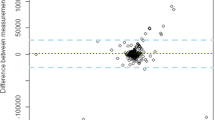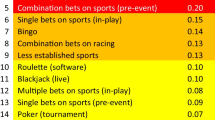Abstract
Many recent studies of internet gambling—particularly those that have analysed behavioural tracking data—have used variables such ‘bet size’ and ‘number of games played’ as proxy measures for ‘gambling intensity’. In this paper it is argued that the most stable and reliable measure for ‘gambling intensity’ is the ‘theoretical loss’ (a product of total bet size and house advantage). In the long run, the theoretical loss corresponds with the Gross Gaming Revenue generated by commercial gaming operators. For shorter periods of time, theoretical loss is the most stable measure of gambling intensity as it is not distorted by gamblers’ occasional wins. Even for single bets, the theoretical loss reflects the amount a player is willing to risk. Using behavioural tracking data of 100,000 players who played online casino, lottery and/or poker games, this paper also demonstrates that bet size does not equate to or explain theoretical loss as it does not take into account the house advantage. This lack of accuracy is shown to be even more pronounced for gamblers who play a variety of games.

Similar content being viewed by others
References
Auer, M., Schneeberger, A., & Griffiths, M. D. (2012). Theoretical loss and gambling intensity: A simulation study. Gaming Law Review and Economics, 16, 269–273.
Broda, A., LaPlante, D. A., Nelson, S. E., LaBrie, R. A., Bosworth, L. B., & Shaffer, H. J. (2008). Virtual harm reduction efforts for Internet gambling: Effects of deposit limits on actual internet sports gambling behaviour. Harm Reduction Journal, 5, 27.
Colbert, G., Murray, D., & Nieschwietz, R. (2009). The use of expected value in pricing judgements. Journal of Risk Research, 12, 199–208.
Dragicevic, S., Tsogas, S. B., & Kudic, A. (2011). Analysis of casino online gambling data in relation to behavioural risk markers for high-risk gambling and player protection. International Gambling Studies, 11, 377–391.
Griffiths, M. D., & Auer, M. (2011). Online versus offline gambling: Methodological considerations in empirical gambling research. Casino and Gaming International, 7(3), 45–48.
Griffiths, M. D., & Whitty, M. W. (2010). Online behavioural tracking in Internet gambling research: Ethical and methodological issues. International Journal of Internet Research Ethics, 3, 104–117.
LaBrie, R. A., Kaplan, S., LaPlante, D. A., Nelson, S. E., & Shaffer, H. J. (2008). Inside the virtual casino: A prospective longitudinal study of Internet casino gambling. European Journal of Public Health, 18, 410–416.
LaPlante, D. A., Kleschinsky, J. H., LaBrie, R. A., Nelson, S. E., & Shaffer, H. J. (2009). Sitting at the virtual poker table: A prospective epidemiological study of actual Internet poker gambling behavior. Computers in Human Behavior, 25, 711–717.
LaPlante, D. A., Schumann, A., LaBrie, R. A., & Shaffer, H. J. (2008). Population trends in internet sports gambling. Computers in Human Behavior, 24, 2399–2414.
Li, S. (2003). The role of Expected Value illustrated in decision-making under risk: Single-play vs multiple-play. Journal of Risk Research, 6, 113–124.
Nelson, S. E., LaPlante, D. A., Peller, A. J., Schumann, A., LaBrie, R. A., & Shaffer, H. J. (2008). Real limits in the virtual world: Self-limiting behavior of Internet gamblers. Journal of Gambling Studies, 24, 463–477.
Wardle, H., Moody, A., Griffiths, M. D., Orford, J., & Volberg, R. (2011). Defining the online gambler and patterns of behaviour integration: Evidence from the British Gambling Prevalence Survey 2010. International Gambling Studies, 11, 339–356.
Conflict of interest
The authors declare that they have no conflict of interest.
Author information
Authors and Affiliations
Corresponding author
Rights and permissions
About this article
Cite this article
Auer, M., Griffiths, M.D. An Empirical Investigation of Theoretical Loss and Gambling Intensity. J Gambl Stud 30, 879–887 (2014). https://doi.org/10.1007/s10899-013-9376-7
Published:
Issue Date:
DOI: https://doi.org/10.1007/s10899-013-9376-7




